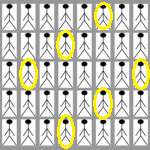Randomized Clinical Trial (RCT): Simple Definition, Phases, and Types >

In clinical research, an adaptive design is a type of experimental design that allows for modifications to the study based on data collected during the course of the study. Adaptive designs can make clinical trials more flexible and efficient by allowing for changes to be made to the study without needing to go through the formal process of amending the protocol. One type of adaptive design is an adaptive randomization trial.
In an adaptive randomization trial, the probability of treatment assignment changes according to assigned treatments of patients already in the trial. This allows for a more efficient use of resources by reducing exposure to ineffective treatments and minimizing participant burden. Additionally, this type of design can also allow for a better understanding of how different treatments compare to each other.
Limitations of standard Designs
There are some limitations to standard clinical trial designs that can be addressed through the use of adaptive designs. For example, when a clinical trial is powered to detect a difference between two treatments, it is not possible to tell if this difference is due to a true difference between the treatments or due to chance. However, if an adaptive design is used, it may be possible to increase the power of the study while it is ongoing, which can give a more definitive answer as to whether or not a treatment difference exists.
Another limitation of standard designs is that they often do not allow for much flexibility once the study has begun. If it is found that one treatment is more effective than another, it may not be possible to change the allocation ratio without changing the protocol and going through formal amendment processes. However, with an adaptive design, such changes can be made without needing to go through these formalities.
Overall, adaptive designs can offer many benefits over traditional trial designs; however, they are not without their own limitations and challenges. It is important that these are taken into account when planning a clinical trial so that an informed decision can be made as to whether or not an adaptive design is right for the study in question.
Adaptive randomization
Adaptive randomization trials are a type of experimental design that allows for modifications to be made to the study based on data collected during the course of the study. This type of design can offer many benefits over traditional trial designs; however, it is important to take into account both the advantages and disadvantages before deciding if an adaptive design is right for your study.